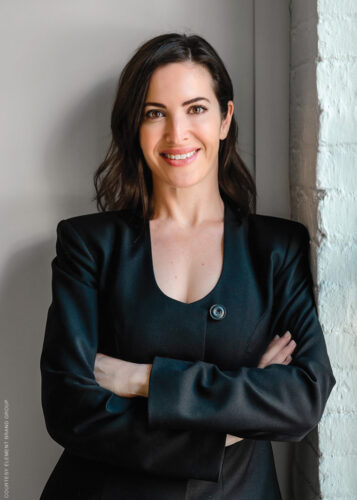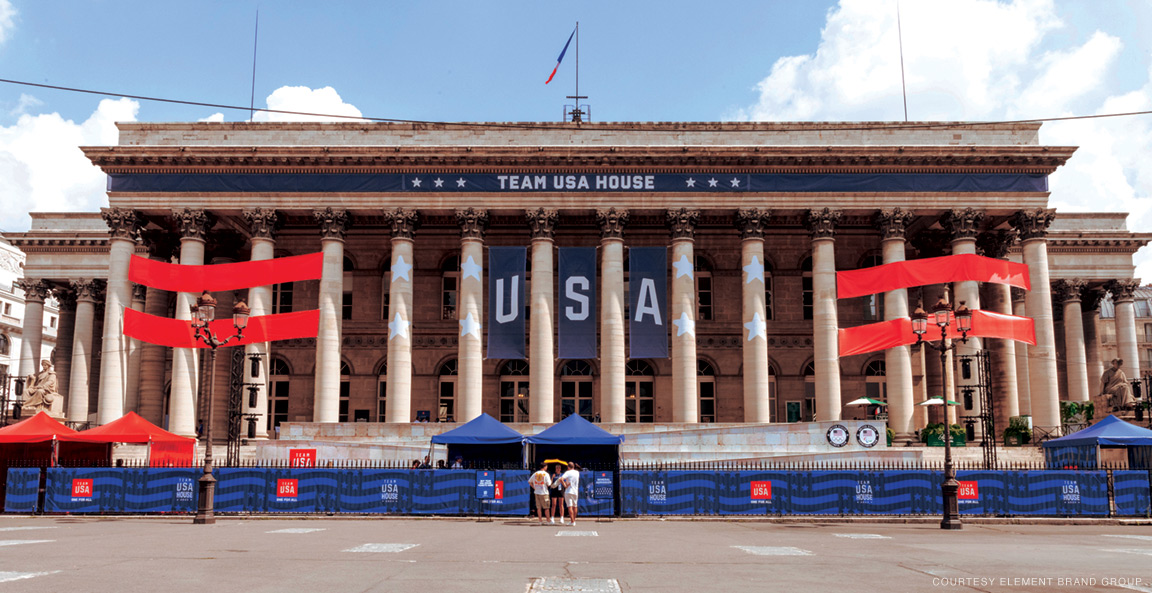
This marketing and brand strategist “created a digital cheer squad for Team USA” in Paris this summer.
“It was a really special thing to see all of your fellow Americans coming together to support a common cause,” says Heather Leeds Greenfield C’00. “It was a one team, one dream scenario to collaborate to support our athletes.”
A marketing and brand strategist, Greenfield lived out that dream this summer in Paris, where she was tasked with enticing Americans back home, especially younger ones, to watch the 2024 Summer Olympics.
“While the Olympics have high brand recognition,” says Greenfield, television ratings had been declining. “Younger kids, especially the GenZennials, aren’t consuming TV in the same way, so the remit was: How do we get more people excited about the Olympics?”

Greenfield—who owns Element Brand Group, a company based in Los Angeles and New York that specializes in brand strategy, media relations, talent partnerships, and integrated marketing—did it by building a team of influencers and celebrities to come to Paris, watch the Games, meet the American athletes, and post what they were seeing online. “We created a digital cheer squad for Team USA,” she says.
She arranged fun coverage opportunities for social media personalities such as Brittany Broski, who streamed a video with women’s rugby star Ilona Maher to her more than seven million TikTok followers. She accompanied Hollywood celebrities like Elizabeth Banks C’96 to the Team USA House at Palais Brongniart (which was built in the early 19th century to house the Paris Stock Exchange) to mingle with the athletes and watch NBC’s live coverage. And she took influential figures to the sporting events to make sure they captured the action and shared it with audiences back home.
One of her favorite memories was watching beach volleyball—at the sand courts set up in front of the Eiffel Tower—with basketball superstar and Team USA gold medalist LeBron James. “We got there, and this huge thunderstorm happened halfway through the match, and everybody fled,” Greenfield says. “But not LeBron. He stayed, and once the skies cleared up, the match resumed, and we were the only people left in the crowd. To see one Olympic athlete really support other ones, people he doesn’t even know, it was really nice to see.”
The efforts worked: According to NBC, an average of 30.6 million people tuned into the Olympics daily across all of its platforms—an 82 percent increase from the Tokyo Games three years ago. And led by Peacock, 23.5 billion minutes of Paris Olympics coverage were streamed—up 40 percent from all prior Summer and Winter Olympics combined.
Greenfield has been interested in marketing from an early age. She remembers flipping through Seventeen and Cosmopolitan magazines as a teenager and focusing on the ads. “I loved that they were these worlds you could jump into via these actors and models and envision yourself in them,” she says.
She knew she wanted to study communications, which helped her home in on Penn’s Annenberg School for Communication “as the right place for me.” She minored in French and spent a year abroad in Paris, mastering the language (which would come in handy decades later at the Paris Olympics). While there she also interned in the marketing department of Warner Bros., aiding in the distribution of American films in France. “We were trying to understand what would appeal to a French demographic,” she says. “It was how to recut a trailer, how to pick different stills for movie posters. It was interesting to learn that things I found appealing as an American wouldn’t be the same for a French audience.”
After graduating and trying a few different jobs, she landed at the national film publicity department at Universal Studios. Working with actors and filmmakers, she helped create the publicity campaigns for box office hits like Jurassic Park, Seabiscuit, and A Beautiful Mind.
That led to her next gig at the public relations company ID, where she stayed for more than a decade and helped create publicity strategies for celebrities including Salma Hayek, Ellen DeGeneres, and Jennifer Connelly. “When you are promoting a film or one project, you want to get as much publicity as possible, but with talent you have to be strategic,” she says. “It’s part of a long line of projects that person has coming, and you might want to save that big interview for something coming out later that year.”
In her role she often received requests from brands hoping that her clients would promote their products or participate in campaigns. The way the industry was changing fascinated her. “It used to be trade deals,” she says. “Someone would say give us a quote about this mascara, and we will give you a lifetime supply of makeup.” But by the early 2000s, brands were getting more sophisticated with how they used talent, realizing if they employed celebrities for long-term partnerships or created more nuanced publicity opportunities, the return on investment was greater. “We told these stories about this brand doing really great things with this really great talent, and it would create narratives that media editors wanted to write about,” she says. The change also coincided with the rise of social media, which created more opportunities for celebrities to showcase different brands.
Along with an experienced brand executive, she convinced ID to let her start a brand partnership division, which she grew from three people to 30. Her clients included Starbucks, which was trying to create unique music and films that could be played in coffee shops, and Tiffany, which wanted to get exposure for its jewelry by dressing celebrities on red carpets. “Tiffany is still my client to this day,” Greenfield says. “They are my most long-standing client.”
Eight years ago, Greenfield decided to form her own company with two other employees from ID. Element Brand Group now employs nine people and boasts a client roster that includes Airbnb, Aston Martin, Universal Music Group, Tiffany, and Coca Cola, the latter of which led her to Team USA. “A former client of mine at Coca Cola looped me in with her team at the beginning of last year,” Greenfield says. “The planning for any Olympics really starts years in advance.”
Which means she’s already looking forward to the next Olympics. “Given I am a native Los Angeleno, LA 2028 seems like a perfect fit.”
—Alyson Krueger C’07

